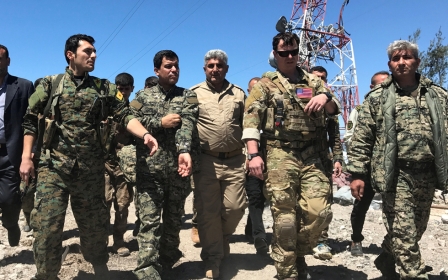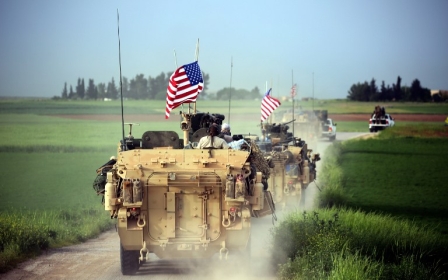Another killer solution for Syria: Using one group of terrorists to fight another

Since March 2011, solving the Syrian conflict has been right at the top of the global security agenda.
It is difficult to remember, let alone to count, the array of multi-dimensional and multi-national initiatives this conflict has generated, from the "Annan Plan" and "Friends of Syria" to Astana talks and other UN initiatives. All have failed.
The focus on fighting IS in Syria has legitimised and camouflaged all sorts of crimes and cruelties
Though this failure can be explained in a number of ways, there is a fairly simple explanation for the chief dynamic operating here: a comprehensive solution beyond tactical moves and proxy wars has been missing. Worse, every time the Syrian crisis has been discussed, the discussion has never been about Syria entirely.
The Assad regime's use of chemical weapons and the murder of over half a million Syrians on all sides has not changed this either. Geopolitics was replaced by tactics and political solutions replaced by populist fears.
With the rise of such a useful and comfortable an enemy as the Islamic State (IS) group, the death of geopolitics in Syria might as well have been announced. IS took the limelight from the Syrian tragedy and the crisis in the Middle East and fighting the group became a free market product anyone could buy. It's a shift that has legitimised and camouflaged all sorts of crimes and cruelties.
The mistake of PYD against IS
Russia, US, Iran, the Assad regime, Gulf states, France, Syria’s neighbours, Canada, the EU, Australia - while over four years of "combat" none of these countries has been able to cleanse IS from Syria and Iraq, the group was defeated and eradicated everywhere else.
How is it possible that IS lives on despite the fact that it can bring together Iran and Israel, US and Russia, the Gulf and Iraq?
Turkey crushed the group in four months. Yet a grand and unlikely coalition of nations that fought each other in the 20th century has so far failed to eliminate IS in its home territory.
How is it possible that IS lives on despite the fact that it can bring together Iran and Israel, US and Russia, Gulf and Iraq - and revive the "end of history" thesis? How can such a coalition - one unimaginable in the 20th century - fail to defeat a terrorist organisation?
There can only be two possibilities: either IS is militarily stronger than the coalition or there is a problem in the way the coalition is fighting.
A miraculous element in this coalition is the Democratic Union Party (PYD). The PYD is an anachronistic Marxist organisation that emerged in late 2011, the same year as IS. It is the Syrian franchise of the PKK terrorist group that has murdered tens of thousands of people in Turkey.
To make matters worse, we are told to believe that the PYD represents the entire Kurdish population in Syria. A blind eye and a deaf ear are turned in order to work with the PYD, a tactic that is used only because the US has been unable to develop a policy for Syria. This is a trend which continues under the new administration.
If all you have is a hammer
One of the most important excuses given for the lack of action on the Syrian crisis in 2012 and 2013 was the question of what would happen if Assad were to go. This was an important question to ask. However, it went beyond mere curiosity and concern and eventually became an excuse not to intervene.
Those who asked the Assad question have avoided asking the same question about IS: what will happen if IS is eliminated?
At the same time, those who asked the Assad question have avoided asking the same question about IS: what will happen if IS is eliminated? They have moved forward using the PYD for their fight without thinking through what it would means for Kurds, Arabs and Turkmen if IS is eradicated from Syria.
What will regional actors and Iraqi Kurdistan make of the PYD in a post-IS era? They don't have an answer to that question either.
► READ MORE:
Anarchy in the YPG: Foreign volunteers vow Turkish 'revolution'
Their strategy of fighting one terrorist organisation with another is not a serious one for the long-term stability of Syria, nor the region. And so we are left in a situation only with military tactics, not solutions.
If all you have is a hammer, everything looks like a nail: the fight against IS continues without any regard for potential regional political and security consequences of the current military approach.
An Iraq repeat?
The fact that this could possibly end in another disaster, in another Iraq, is pushed aside. Meanwhile, the myopia displayed 15 years ago in the fight against al-Qaeda - the primitive approach that produced a powerful spillover - is only being replicated.
Today, in the fight against IS, a purely military approach again ignores the sophisticated politics of the struggle and probable geopolitical consequences.
The only thing that will come of out supporting a terrorist organisation that launched suicide attacks in Turkish cities will be more chaos
Turkey is one of the countries that has paid the highest price socially, economically and in terms of the lives lost to terror as a result of the Syrian crisis. Arming a Marxist and ethnically motivated terrorist organisation against Turkey will have significant regional consequences. The only thing that will come of out supporting a terrorist organisation that launched suicide attacks in Turkish cities will be more chaos.
Given the stark consequences of helping a terrorist organisation dedicated to launching attacks in Turkey, it is our legitimate right - and of critical importance to regional security and stability - to fight all terrorist organisations in Syria that threaten our national security, even if this will create tensions which could rupture US-Turkey relations altogether.
Good for Hollywood, not Syria
The transformation of the PYD into an actor on steroids carries serious consequences for Syria, Iraq and Iran, yet the current military strategy in place in Syria is completely devoid of any understanding of Syria or the Middle East.
And it is highly unlikely that this military strategy, invented out of desperation during the Obama administration, will be effective after the Syrian crisis has gone through so many more twists and turns.
Does the delusion of fighting terrorism by using other terrorists offers any semblance of a solution in Syria?
Everybody is curious to know how Turkey will react if the PYD is given heavy arms. But this is not a question Turkey needs to answer. Turkey will fight terror after - or if - the PYD-PKK is equipped with heavy arms in the same way it has fought it before.
The real question is whether the delusion of fighting terrorism by using other terrorists offers any semblance of a solution. Of course, for adherents of a military approach, these questions may seem worthless.
However, leaving these existential questions unanswered in Syria where terrorist organisations run amok may come to mean the reproduction and reincarnation of IS in Syria and beyond.
While the idea that a hyper-secular, Marxist organisation saving Raqqa, a historical Sunni centre, from IS could be a great script for a Hollywood movie, on the ground, it will only escalate the current crisis.
Every step that has been taken so far in Syria that has disregarded political and regional consequences has only created more chaos than it has solved.
Even if Turkey was not so against the arming of the YPG, it's a plan that should be abandoned while there is still time to avoid the massive collateral damage that it will create.
- Taha Ozhan is a member of Turkish Parliament and chairman of Foreign Affairs Committee. He is an academic and writer. Ozhan holds a PhD in Politics and International Relations. He frequently comments and writes for international media. His latest book is Turkey and the crisis of Sykes-Picot Order (2015).
The views expressed in this article belong to the author and do not necessarily reflect the editorial policy of Middle East Eye.
Photo: Fighters take part in an obligatory nine month training, led by the YPG, at a training camp in the northern Syrian town of Rmeilane in March 2016 (AFP)
Middle East Eye propose une couverture et une analyse indépendantes et incomparables du Moyen-Orient, de l’Afrique du Nord et d’autres régions du monde. Pour en savoir plus sur la reprise de ce contenu et les frais qui s’appliquent, veuillez remplir ce formulaire [en anglais]. Pour en savoir plus sur MEE, cliquez ici [en anglais].







